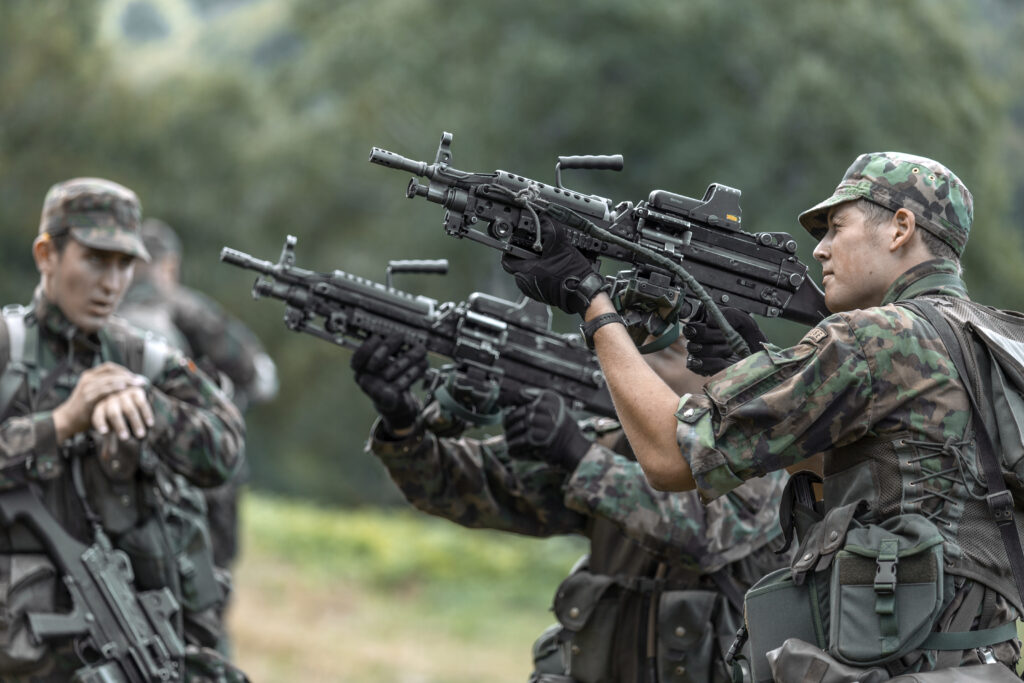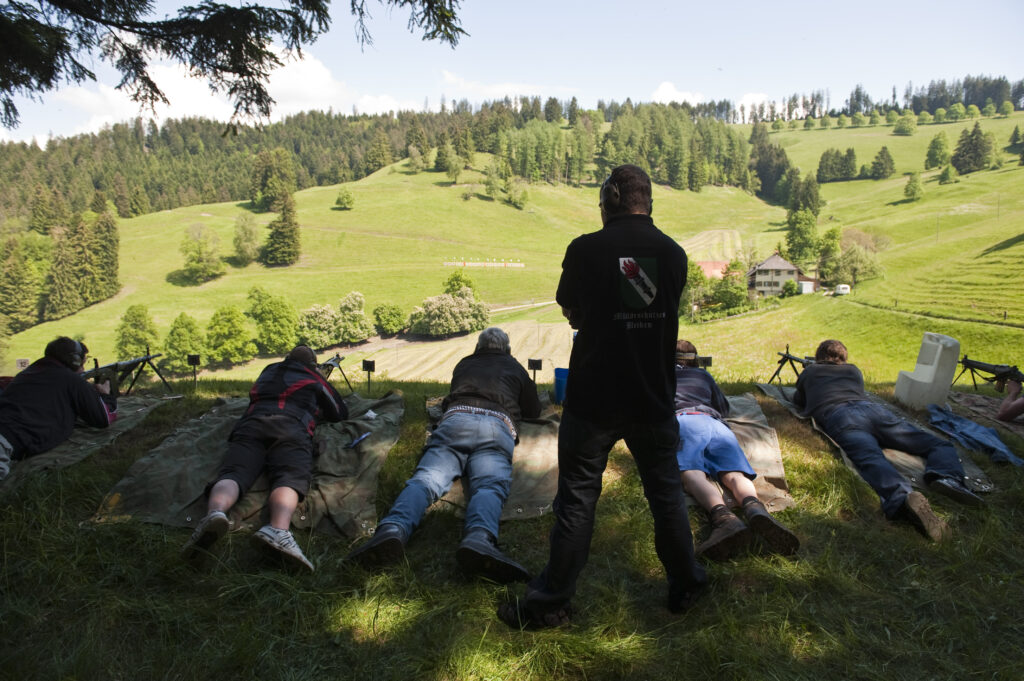Mi., März 29th 2023

In the days since another school shooting has rocked the United States, discussions surrounding gun laws and European nations have circulated more fervently in an effort to understand the difference in gun regulations and outcomes.
It might shock some to discover that Switzerland is one of the most-armed countries in Europe, considering that it is a neutral country. That is, an “armed neutral country;” meaning that Switzerland is politically neutral, but allowed to arm and defend itself from invaders. For this reason, military service is compulsory in Switzerland and the country maintains a high level of defense at all times. Members of the military get to keep their weapons at home — which is part of a larger tradition of keeping civilians armed that has kept Switzerland safe during two world wars, historians say.
It also means that the rate of guns per capita is rather high in Switzerland; although owners are thoroughly trained and have completed a number of checks before being allowed to purchase a gun.
Our writer sits down with a Swiss gun expert to explore Swiss gun culture and how the country has largely avoided mass shootings.

All men between the age of 18-34 have to enlist into the Swiss military as long as they’re fit for service. There’s also a growing number of women who voluntarily join the army. In 2021 there were more than 1,700 women who chose to enlist.
Both Swiss men and women receive intense mandatory training at the age of 18 and are considered part of the Swiss army until the age of 34. In between those years, the military personnel refresh their skills with short, mandatory training sessions.
All military personnel are equipped with a Swiss Army gun. For the whole duration of their military service – so until they’re 34 years old – this weapon is theirs and is usually kept at home. Once they have completed the mandatory military term, they have the option to apply for a gun owner license and then buy their service weapon from the army.
To ensure safety however, it is recommended to keep the barrel separate from the rest of the gun. This is to prevent accidental shootings and to make the gun useless for anyone who would try to steal it.

Obwohl das Militär häufig der erste Ort ist, an dem Schweizerinnen und Schweizer mit Waffen in Berührung kommen, ist es nicht der einzige.
"Die Schützenvereine (Schützenvereine) haben in der Schweiz eine lange Tradition, die bis ins 14. Jahrhundert zurückreicht", erklärt Peter Nussbaumer, Administrator des Schützenvereins ‘Pistolenschützen Ägerital – Morgarten.’ "Sie bieten regelmäßig Workshops für Jugendliche an, in denen diese zum ersten Mal eine Waffe in die Hand nehmen können", fügt er hinzu.
Für Nussbaumer waren diese Workshops sein Einstieg in die Welt des Schießens. Schützenverein Die Mitglieder üben ihre Schießkünste auf Zielscheiben und treten manchmal auch gegeneinander an. Traditionell werden die Schützenvereine were there to protect the cities in case of an attack. Nowadays shooting is simply seen as a sport – much like football.
"Der Schiesssport ist in der Schweizer Bevölkerung nicht wirklich ein kontroverses Thema. Die meisten verstehen, dass es nur ein Hobby ist", erklärt Nussbaumer.

There are about two million privately owned guns in Switzerland in a population of about 8.3 million people — a rather high rate globally. Nonetheless there have only been only six mass shootings in Switzerland in the last 110 years (meaning four or more people were killed). Even these incidents were generally interpersonal relationships where the shooter killed members of their family. There has never been a school shooting in Switzerland. This is why Switzerland has become a common example used by proponents of the NRA to point out that a high rate of gun owners doesn’t automatically lead to more mass shootings.
So then, why is there so much more violence in the U.S. compared to Switzerland? According to experts, here are a few possible reasons.
Die Gründe, warum Menschen eine Waffe kaufen, sind vielfältig.
"Ich kenne die Beweggründe eines Waffenbesitzers nicht, der dem Schützenverein has, but I can assure you that if you try to buy a gun in Switzerland because you want to protect yourself, you won’t get far,” says Nussbaumer. When Swiss men and women keep army rifles at home, it is usually seen as a way to protect the country should it ever be attacked. U.S. citizens, on the other hand, report buying guns to protect themselves from enemies within the country’s borders, according to Gallup polls.
Schweizerinnen und Schweizer bekommen nicht einfach eine Waffe in die Hand gedrückt, ohne dass ihnen etwas erklärt wird. Jeder Soldat erhält eine gründliche Ausbildung im Umgang mit der Waffe und ihrer richtigen Aufbewahrung. Diese Ausbildung kann viele versehentliche Schießereien verhindern.
Wenn Sie in der Schweiz eine Waffe kaufen wollen, müssen Sie ein langwieriges Verfahren durchlaufen. Ob Sie eine Waffenerlaubnis erhalten oder nicht, wird immer auf lokaler Ebene entschieden und von der Kantonspolizei kontrolliert. Um einen Waffenschein zu beantragen, müssen Sie mindestens 18 Jahre alt sein, dürfen nicht vorbestraft sein und müssen sich einer gründlichen Identitätsprüfung unterziehen. Die Polizei ist auch dafür bekannt, Psychiater zu konsultieren, wenn sie entscheidet, ob ein Waffenschein bewilligt oder verweigert wird.
Wenn Sie in der Schweiz jemals eine Waffe einsetzen würden, um ein persönliches oder gesellschaftliches Problem zu lösen, würden Sie wahrscheinlich mit mehr Problemen als Lösungen davonkommen.
"Es gibt einfach keinen Anreiz, eine Waffe zu benutzen. Wir haben genügend wirksame Rechtsmittel, mit denen man sich entweder schützen oder sogar wehren kann", sagt Nussbaumer zum Thema. Besonders Mitglieder einer Schützenverein würde nie auf die Idee kommen, eine Waffe zu benutzen, um Probleme zu lösen.
“Whenever someone uses a gun in a negative way, it harms the weapon’s image and therefore us and our hobby. We don’t want our guns to be taken away just as much as a cyclist wouldn’t want to lose their bicycle,” he adds.
Nussbaumer macht einen sehr guten letzten Punkt: Das Problem ist nie die Waffe selbst. Es ist immer die Person, die die Waffe hält.
Dieser Artikel darf frei weitergegeben und nachgedruckt werden, vorausgesetzt, es wird auf den Originalartikel verwiesen.
